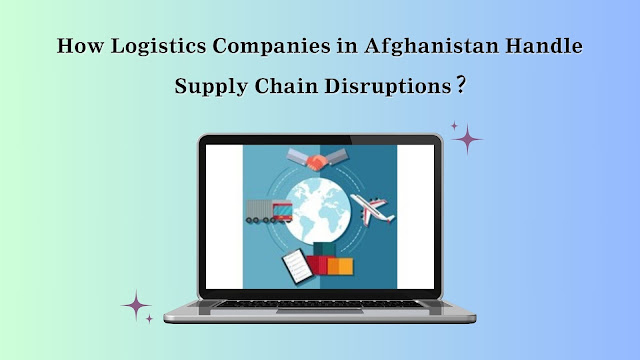2025 Overview of Logistics Companies in Afghanistan Supporting Supply Chains
In 2025, Afghanistan's logistics sector plays a critical role in maintaining trade flow and business continuity across the region. Logistics companies in Afghanistan support various industries by ensuring efficient transport, timely deliveries, and reliable supply chain management — both for domestic distribution and international trade.
Growth of the Logistics Sector in Afghanistan
Afghanistan’s strategic location between Central and South
Asia makes it a key transit hub. Ongoing improvements in customs systems, dry
port facilities, and cross-border road connectivity are enabling faster
logistics operations.
Logisticscompanies in Afghanistan are adapting to growing demand with enhanced
service offerings — including fleet expansion, advanced cargo tracking, and
24/7 delivery management. Their involvement is central to streamlining
procurement and inventory processes for businesses across sectors like
construction, FMCG, and healthcare.
How Logistics Companies in Afghanistan Support Supply
Chains
Modern supply chains rely on consistent movement of goods,
real-time information flow, and minimal disruptions. Here's how logistics
companies contribute to that in Afghanistan:
- Inventory
Management & Distribution: Warehousing services enable businesses
to store, organize, and distribute products closer to markets, reducing
lead times.
- Timely
Transportation: Efficient trucking networks ensure raw materials and
finished goods reach factories, warehouses, and retail outlets on time.
- Customs
Compliance: Trained logistics teams handle paperwork and procedures at
borders, minimizing delays and avoiding fines.
- Real-Time
Tracking: Technology-driven logistics firms provide shipment
visibility, improving planning and reducing uncertainty in the supply
chain.
- Risk
Mitigation: Experienced logistics providers help reroute or adjust
deliveries during border issues or local disruptions, ensuring supply
chains remain active.
These capabilities help businesses cut costs, meet customer
expectations, and respond to market changes quickly.
Role of Sea Freight Companies in Afghanistan
Even as a landlocked nation, Afghanistan depends heavily on
maritime trade. SeaFreight Companies in Afghanistan manage the crucial first and last-mile
transport between Afghan importers/exporters and regional seaports — especially
Karachi (Pakistan), Gwadar (Pakistan), and Bandar Abbas (Iran).
Their role includes:
- Port
Coordination: Arranging container loading/unloading, ensuring timely
vessel connections.
- Freight
Consolidation: Helping businesses reduce costs by grouping smaller
shipments.
- Customs
Clearance at Ports: Managing transit documentation to prevent
clearance delays.
- Supply
Chain Continuity: Ensuring goods reach inland Afghanistan without
breakage or delay — vital for time-sensitive and bulk shipments.
In supply chain terms, they bridge the gap between
international suppliers and domestic markets, making long-distance trade viable
and predictable.
Challenges in the Afghan Logistics Sector
- Unstable
Security Zones: Route planning must factor in safe zones, increasing
operational complexity.
- Limited
Rail Options: Most shipments depend on road networks, which may face
congestion or wear.
- Border
Inefficiencies: Delays in customs clearance at some land crossings can
impact delivery schedules.
Despite these challenges, logistics companies are investing
in tech tools, training, and partnerships to overcome hurdles and maintain
strong supply chain links.
Choosing the Right Logistics Partner
To ensure your supply chain remains efficient, choose a
logistics provider with:
- A
wide transportation and port-access network
- Proven
customs handling expertise
- Modern
tech for real-time cargo updates
- Strong
track record in your specific industry
Whether for local delivery or global trade, the right
partner keeps your supply chain moving smoothly.
Final Thoughts
Logistics companies in Afghanistan are not just service
providers — they are supply chain enablers. By offering end-to-end transport,
freight handling, and distribution support, they reduce risks, improve speed,
and strengthen business resilience.
For international movements, working with well-connected Sea Freight Companies ensures
goods flow seamlessly between continents and Afghan markets, securing your
supply chain in a challenging but opportunity-rich region.




Comments
Post a Comment